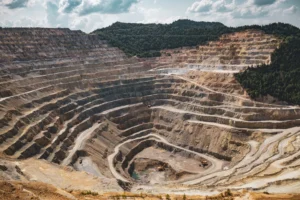Blockchain technology can be used across diverse sectors including supply chain management, energy, agriculture, and environmental conservation to improve sustainability practices.
It supports sustainability efforts by providing transparent and fixed records of various processes.
Blockchain is a digital system for recording information. It stores data in blocks, linked together in a chain. Once information is added to a block, it cannot be changed. This makes it secure and transparent.
Innovative technologies such as blockchain or features of blockchain supports sustainability efforts to improve visibility, reduce waste, and boost resource use, thereby supporting sustainability efforts in important ways.
What is Blockchain?
Blockchain is basically a digital ledger shared across a network of computers. Imagine it as a chain of blocks, each containing a record of transactions.
Once information is added to a block, it cannot be changed or deleted, making it highly secure and transparent.
This decentralized system ensures no single entity has control over the data, promoting trust and reliability.
How can features of Blockchain support Sustainability efforts

Features of blockchain support sustainability efforts by establishing transparent and immutable records of complex supply chains. This technology enables efficient energy management through decentralized platforms.
Blockchain facilitates the tracking and verification of environmental impact metrics.
Blockchain technology supports sustainability efforts by providing visibility, tracking, and efficiency in various industries. Its fixed ledger confirms that all transactions are reliable, promoting good and sustainable practices.
If you want to know, how can features of blockchain support Sustainability efforts? These are the most important ones.
Main Areas Where Blockchain Supports Sustainability
1. Supply Chain Transparency
- Blockchain can rise supply chain speed by up to 50%, reducing delays and costs linked with traditional ways.
- Tracks product origin, ensuring ethical sourcing and fair labor practices.
- Reduces waste and identifies unsustainable practices.
- Waste Reduction: Companies using blockchain for supply chain management have reported up to a 30% reduction in waste due to improved visibility and tracking.
- Agriculture Impact: Using blockchain in agriculture can lead to a 25% reduction in food waste by boosting supply chain logistics.
2. Empowering Sustainable Energy
- Blockchain-based peer-to-peer energy trading can reduce energy transfer losses by up to 20%, making energy sharing more efficient and sustainable.
- Supports peer-to-peer trading of renewable energy.
- Blockchain can lower energy costs by 10-20% by helping more efficient energy markets and reducing transaction costs.
- Allows transparent carbon footprint tracking and offsetting.
- Carbon Footprint: Blockchain technology can help reduce the carbon footprint of industries by providing accurate tracking and verification of carbon credits, making sure that companies meet their environmental targets effectively.
- Monitors resource usage and distribution to prevent overexploitation.
- Promotes efficient allocation and responsible practices.
- Water Management: Blockchain technology can improve water management systems, potentially reducing water waste by 30%.
4. Revolutionizing Waste Management
- Improves waste tracking and recycling rates.
- Motivates sustainable waste management practices.
- Recycling Speed: Blockchain-based recycling programs can improve recycling rates by 20%, boosting proper waste disposal.
5. Enhancing Environmental Data Management
- Securely stores and shares environmental data for research and policymaking.
- Increases public awareness about environmental issues.
- Consumer Trust: 73% of consumers are willing to pay more for products that offer full visibility and tracking through blockchain.
Features of Blockchain Driving Sustainability

Blockchain technology is revolutionizing the way we approach sustainability. Its unique features empower us to create a more sustainable future.
1. Transparency
One of the main features of blockchain is its fixed ledger. Once a transaction is recorded, it cannot be changed or deleted.
Blockchain creates a secure and transparent record of transactions. This allows you to see exactly where your products come from and how they were made. This empowers you to make informed choices about the products you buy.
2. Immutability
Once information is added to a blockchain, it cannot be altered. This builds trust in sustainability claims, as you can be confident that the data you see is accurate and hasn’t been tampered with.
Guarantees data honesty and prevents manipulation, building trust in sustainability claims
3. Decentralization
Blockchain eliminates the need for facilitators, which can streamline processes and reduce costs. This can make sustainable practices more affordable and accessible.
4. Smart Contracts
Smart contracts are instant contracts with the terms of the agreement directly written into code. These self-executing contracts can automate sustainable practices, ensuring that they are carried out efficiently and without errors.
Blockchain Features: Practical Implementations

Supply Chains
Blockchain’s visibility and tracking have made it a very important tool in supply chain management for numerous industries.
For example, the diamond industry uses blockchain to certify the right sourcing of diamonds, reducing the market for illegal diamonds and promoting responsible mining practices.
Moreover, blockchain can help in confirming fair trade practices and making sure that workers involved in the supply chain are treated right.
Energy
The energy sector is using blockchain for more efficient and sustainable energy distribution. One main example is the use of blockchain for managing renewable energy certificates (RECs).
These certificates confirm that electricity has been generated from renewable sources. By using blockchain, the method of buying, selling, and tracking RECs becomes more efficient and visible, helping more investment in renewable energy projects.
Waste Management
In waste management, blockchain can boost the tracking of waste from its source to disposal. This helps in making sure that waste is properly managed and recycled.
For example, some companies are using blockchain to track electronic waste, making sure that it is disposed of in an environmentally friendly manner and reducing the risk of illegal dumping.
Blockchain can also boost proper waste disposal by providing digital tokens or rewards for recycling efforts, thus helping more people to participate in waste reduction activities.
Advantages of Blockchain in Sustainability Efforts
Blockchain Reduces Fraud
Blockchain’s transparency can help prevent misleading claims about a product’s environmental impact. By providing a verifiable record, it ensures that companies are held accountable for their sustainability claims, building trust and encouraging genuine eco-friendly practices.
Block Chain Boosts Farming
Blockchain’s automated system can streamline sustainable agriculture. By using smart contracts, it speeds up crop monitoring and distribution, reducing food waste.
This efficiency benefits both farmers and consumers through lower costs and fresher produce, creating a more sustainable food system.
Blockchain Builds Trust and Collaboration
Blockchain’s transparency and security create trust among consumers, investors, and partners. This trust promotes collaboration and leads to more effective sustainability initiatives as everyone can rely on the accuracy of the data.
Challenges and Solutions

Blockchain's Energy Challenge
While traditional blockchain mining is energy-intensive, newer protocols like Proof of Stake (PoS) are emerging as more energy-efficient alternatives, making blockchain a greener technology.
These alternative methods require less computational power and, consequently, less electricity, making blockchain more environmentally friendly.
Challenges in Blockchain Adoption
Widespread blockchain adoption faces hurdles such as complex regulations and resistance to change.
Governments, industries, and technology experts must collaborate to create clear, supportive rules for blockchain while securing its responsible use.
Education is important to overcoming public disbelief and promoting blockchain’s potential for sustainability and sustainable technology.
The Future of Blockchain and Sustainability
Blockchain's Growing Role in Sustainability
Blockchain technology is rapidly evolving, with new innovations expanding its potential for sustainability.
Improvements such as scalability, IoT integration, and improved smart contracts are enabling more efficient resource management, better environmental impact tracking, and increased accountability in sustainable practices.
Blockchain: A Powerful Tool for Sustainability
Blockchain holds immense potential to drive sustainability efforts across industries. As its adoption grows and technology advances, it will become an essential tool for achieving environmental goals.
Early adopters stand to gain a competitive edge by showing transparency and efficiency in their operations.
The Bottom Line
Blockchain’s potential to revolutionize sustainability cover many industries. From tracking the journey of products to refining energy grids and ensuring ethical sourcing, this technology is reshaping how we approach environmental challenges.
The features of blockchain support sustainability efforts by providing improved transparency, tracking, and speed, running big progress toward a greener and more sustainable future.
While challenges such as energy use and regulatory challenges exist, ongoing innovations and teamwork efforts can resolve these issues, paving the way for broader adoption.
By using blockchain, businesses and governments can run major progress toward achieving global sustainability goals, supporting a more visible, efficient, and environmentally responsible future.
FAQ's
1. What is blockchain technology?
Blockchain is a decentralized digital ledger that records transactions across several computers securely and transparently.
2. How does blockchain support sustainability?
Blockchain boosts transparency, tracking, and efficiency in various industries, helping to reduce waste, boost resource use, and secure good practices.
3. How blockchain helps with sustainable project management?
Blockchain enhances sustainable project management by providing transparent, secure, and efficient tracking of resources, processes, and impacts.
4. What is the role of blockchain in sustainable development?
Blockchain empowers sustainable development by securing transparency, traceability, and efficiency in resource management and environmental impact tracking.
5. What industries benefit from blockchain for sustainability?
Industries such as supply chain management, energy, agriculture, waste management, and water management benefit from blockchain’s sustainability uses.




